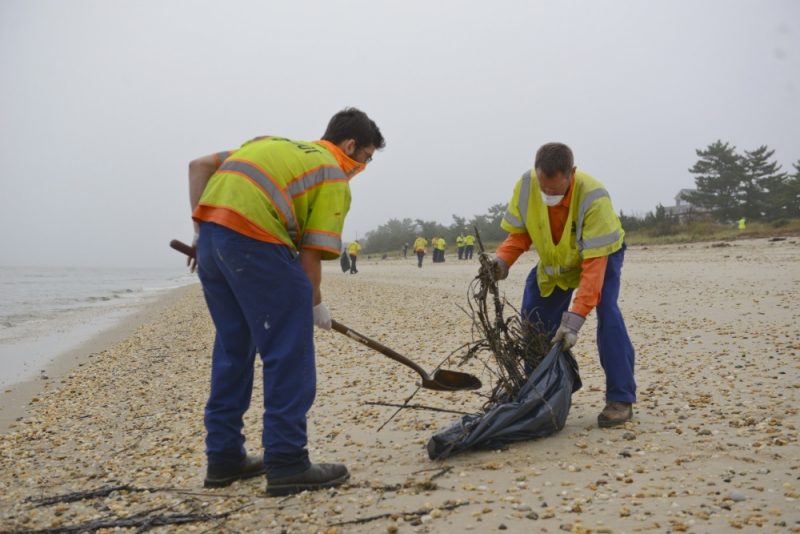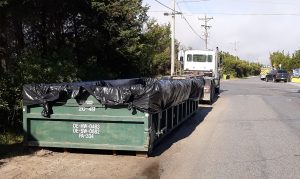Oil Spill Cleanup of Delaware Bay Coastline Intensifies Today With Additional Resources Deployed
Department of Natural Resources and Environmental Control | Department of Transportation | Date Posted: Friday, October 23, 2020
Department of Natural Resources and Environmental Control | Department of Transportation | Date Posted: Friday, October 23, 2020

The Department of Natural Resources and Environmental Control and U.S. Coast Guard continued Thursday and Friday to spearhead a cleanup operation for the oil spill that has deposited blobs of oil called tar balls and oiled debris this week over a stretch of Delaware coastline extending from the upper Delaware Bay to the tip of the Atlantic Ocean. The cleanup operation intensified this morning with additional resources deployed by state and federal agencies and non-profit organizations.
More than 125 environmental professionals from DNREC, the Delaware Department of Transportation (DelDOT), the Coast Guard and its environmental contractor, and the Delaware Bay and River Cooperative are expected to be engaged Friday in removing oil found littering beaches and rafting around debris offshore. The Delaware Bay and River Cooperative, a non-profit funded by industry in the event of an oil spill, dispatched an oil skimming vessel to remove oily debris seen Thursday afloat in the Bay. Tri-State Bird Rescue of Newark continued to play a key role in the cleanup coalition, investigating reports of wildlife impacted by oil and treating captured sea gulls and other wildlife that has been oiled in the water.
“We continue to mobilize our expert resources as the tides spread oil from the beaches back into the water and back on the beach,” said DNREC Secretary Shawn Garvin. “We are combing the beaches and, shovel by shovel, removing the tar balls and contaminated sand.”
The crews are manually removing oil patties and tar balls are being found on various locations along the coast. Approximately 21 tons of oily sand and debris, filling 1 ½ dumpsters, was removed from the affected areas as of 7 p.m. Thursday.
“We are grateful for our interagency collaboration with DelDOT and for the help from the Delaware Bay and River Cooperative enabling us take the cleanup onto the water,” Secretary Garvin said.
The city of Lewes Thursday closed its beaches temporarily due to oil that had come ashore and posed a threat to people and pets alike who visit them. DNREC closed the 4-wheel drive surf fishing crossing at Delaware Beach Plum Island Preserve, overseen by Delaware State Parks, so cleanup operations will not be hampered by vehicles tracking oil onto the sand.
While the oil spill cleanup continues, the Coast Guard and DNREC strongly advise the public not to handle any oily product found or attempt to assist affected wildlife along the shore, but to report these findings to DNREC’s environmental hotline at 800-662-8802 so the situations can be addressed by hazmat-trained professionals.
About DNREC
The Delaware Department of Natural Resources and Environmental Control protects and manages the state’s natural resources, protects public health, provides outdoor recreational opportunities and educates Delawareans about the environment. For more information, visit the website and connect with DNREC on Facebook, Twitter or LinkedIn.
Media Contacts: Nikki Lavoie, nikki.lavoie@delaware.gov; Michael Globetti, michael.globetti@delaware.gov
###
Related Topics: cleanup, DelDOT, dnrec emergency response team, health and safety, oil spill, us coast guard
Keep up to date by receiving a daily digest email, around noon, of current news release posts from state agencies on news.delaware.gov.
Here you can subscribe to future news updates.
Department of Natural Resources and Environmental Control | Department of Transportation | Date Posted: Friday, October 23, 2020

The Department of Natural Resources and Environmental Control and U.S. Coast Guard continued Thursday and Friday to spearhead a cleanup operation for the oil spill that has deposited blobs of oil called tar balls and oiled debris this week over a stretch of Delaware coastline extending from the upper Delaware Bay to the tip of the Atlantic Ocean. The cleanup operation intensified this morning with additional resources deployed by state and federal agencies and non-profit organizations.
More than 125 environmental professionals from DNREC, the Delaware Department of Transportation (DelDOT), the Coast Guard and its environmental contractor, and the Delaware Bay and River Cooperative are expected to be engaged Friday in removing oil found littering beaches and rafting around debris offshore. The Delaware Bay and River Cooperative, a non-profit funded by industry in the event of an oil spill, dispatched an oil skimming vessel to remove oily debris seen Thursday afloat in the Bay. Tri-State Bird Rescue of Newark continued to play a key role in the cleanup coalition, investigating reports of wildlife impacted by oil and treating captured sea gulls and other wildlife that has been oiled in the water.
“We continue to mobilize our expert resources as the tides spread oil from the beaches back into the water and back on the beach,” said DNREC Secretary Shawn Garvin. “We are combing the beaches and, shovel by shovel, removing the tar balls and contaminated sand.”
The crews are manually removing oil patties and tar balls are being found on various locations along the coast. Approximately 21 tons of oily sand and debris, filling 1 ½ dumpsters, was removed from the affected areas as of 7 p.m. Thursday.
“We are grateful for our interagency collaboration with DelDOT and for the help from the Delaware Bay and River Cooperative enabling us take the cleanup onto the water,” Secretary Garvin said.
The city of Lewes Thursday closed its beaches temporarily due to oil that had come ashore and posed a threat to people and pets alike who visit them. DNREC closed the 4-wheel drive surf fishing crossing at Delaware Beach Plum Island Preserve, overseen by Delaware State Parks, so cleanup operations will not be hampered by vehicles tracking oil onto the sand.
While the oil spill cleanup continues, the Coast Guard and DNREC strongly advise the public not to handle any oily product found or attempt to assist affected wildlife along the shore, but to report these findings to DNREC’s environmental hotline at 800-662-8802 so the situations can be addressed by hazmat-trained professionals.
About DNREC
The Delaware Department of Natural Resources and Environmental Control protects and manages the state’s natural resources, protects public health, provides outdoor recreational opportunities and educates Delawareans about the environment. For more information, visit the website and connect with DNREC on Facebook, Twitter or LinkedIn.
Media Contacts: Nikki Lavoie, nikki.lavoie@delaware.gov; Michael Globetti, michael.globetti@delaware.gov
###
Related Topics: cleanup, DelDOT, dnrec emergency response team, health and safety, oil spill, us coast guard
Keep up to date by receiving a daily digest email, around noon, of current news release posts from state agencies on news.delaware.gov.
Here you can subscribe to future news updates.